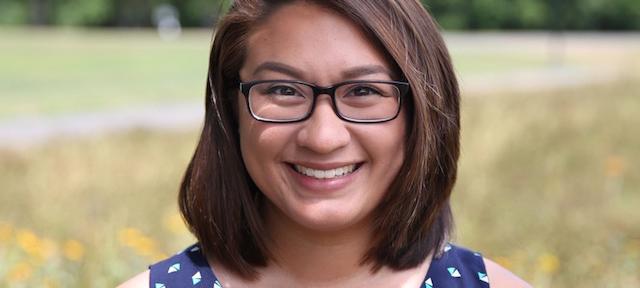Division III Profile: Support Structures for First-Generation College Students

There was this one class, called Getting to College, about college access. I had never thought about what being a first-generation college student meant to me until then. In my first two years at Hampshire, it was really hard to keep up — both academically and socially. The diction used in the classrooms was way above my level of understanding. For my peers, it took maybe an hour or two to get through a week’s reading, but for me it took much longer because I wouldn’t read past a word if I didn’t really understand it. My professor, Dean of Multicultural Education and Inclusion Kristen Luschen, had also been a first-generation student, and we got together and talked about what it would be like if we created structures that would better support students in similar positions.
Our structure at Hampshire is so unique compared to other schools, so not only am I a first-generation student, but I’m first-gen at Hampshire — which adds to the complexity of having to explain my area of studies to my family and friends. I also experienced a lot of homesickness. I’m originally from Houston, so moving to a small town in New England was definitely a culture shock. Transitioning into college at the age of 18 is hard enough, but to have had my entire world shaken upside down was something I didn’t expect.
As for many first-gen students, a big issue for me was the financial barrier. With a little more financial support, I would have been able to focus a bit more on my education rather than on how I was paying to be here. Through the years I just kept giving myself reasons to stay: I’m furthering my education, I’m getting new experiences, I’m going out of my comfort zone — and I’m doing it at my own pace, in my own way. No one was making me stay here.
In 2013, along with other students, I created FIRST on the Journey, an identity-based group for first-generation students. In collaboration with Kristen, who became my adviser and mentor, I also developed the FIRST Network at Hampshire, a network of resources bridging academic affairs and student life, to improve the College’s policies and programs for these students.
For my Division III thesis, titled First in the family: Institutional structures that support first generation college students, I studied college access and retention for first-gen students. My project was broken into three parts. The first focuses on the lived experience of first-gen students. Rather than solely reading about experiences in literature, I wanted to get firsthand accounts of what my first-gen peers and friends experience here at Hampshire. So I hosted a participatory-action retreat, where a group of students talked about topics that influenced our identities as first-gen students. Some of the issues we addressed were how we navigated the college application process, what our family’s roles are in our educational journeys, and whether we felt we were prepared to enter postsecondary education.
For the second part of my Div III, I conducted interviews with representatives from nine other private liberal arts colleges in New England. I was really intentional on making sure I only looked at those kinds of schools. I think it says a lot about Hampshire that at a liberal arts institution, we preach interdisciplinary work and talk about how being a smaller school will allow the college’s representatives to give more attention to students. I didn’t want to just read about it, I wanted to see it in action.
During the process I created narratives based on the roles the interviewees had in the implementation of programs for first-gen students, what those programs look like, and how they themselves are incorporating student voice into how those programs function. Some of them were just getting up to par around language on how to support first-gen students, but others had been doing advocacy work for longer. At some institutions, programs were student-led and student-driven, and at others, a more institutionally top–down approach was taken. I think this research could be beneficial for institutions exploring how to start these conversations, because it constructively examines the experiences of so many schools.
The final section of my Div III offers Hampshire College five institutional programs that could work based on other program models, a literature analysis, and student feedback. It was important to address existing literature — but I also wanted to incorporate program models from schools that have similar structures and equally high levels of dedication to supporting students from diverse backgrounds.
Based on my research, some of the resources and services I recommend are:
• providing first-gen students with advisers who have experience or training working with first-gen issues and experiences;
• structuring a pre-orientation or bridge program for these students;
• developing an alumni mentorship program with graduated first-gens; and
• offering first-gen students a skills-and-knowledge class or recurring workshops on topics like financial literacy, how to utilize office hours, and how to engage with literature and academic resources.
It’s not about saying “this is what would work,” though. It’s talking about why these resources and programs need to be here and in what forms will they exist at Hampshire.
I’m really excited to be to entering the workforce in higher education as an admissions counselor at Hampshire. Being a student here gave me perspective on what needs those of us who are the first in our families to go to college may have. As a staff member, I look forward to helping provide a better sense of belonging for current students to help them thrive here. I’m looking forward to working with incoming students and strengthening the relationship between admissions and student life. I’m currently in the process of applying to graduate school to earn my master’s in higher education and student affairs so that I can one day continue my research as a PhD candidate.



